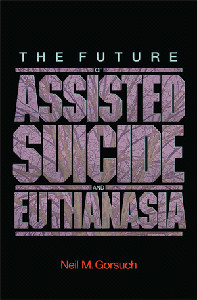The Future of Assisted Suicide and Euthanasia
 | |
| Author | Neil Gorsuch |
|---|---|
| Language | English |
| Publisher | Princeton University Press |
Publication date | 2006 |
| Publication place | United States |
| Media type | |
| Pages | 311 |
| ISBN | 0-691-14097-9 |
| OCLC | 644323498 |
| Part of a series on |
| Euthanasia |
|---|
| Types |
| Views |
| Groups |
| People |
| Books |
| Jurisdictions |
| Laws |
| Alternatives |
| Other issues |
The Future of Assisted Suicide and Euthanasia is a 2006 book by Neil Gorsuch.[1] The book presents legal and moral arguments against euthanasia and assisted suicide, advocating for the retention of bans on the practices.[2] It explores case histories from jurisdictions that have legalized the practice, including Oregon and the Netherlands.[3] The Future of Assisted Suicide and Euthanasia grew out of Gorsuch's doctoral dissertation. While attending Oxford University, he studied legal and ethical issues related to assisted suicide and euthanasia under John Finnis, an Australian legal scholar opposed to assisted suicide.[4][5]
Contents
[edit]In The Future of Assisted Suicide and Euthanasia, Gorsuch treats physician-assisted suicide and euthanasia as morally identical acts.[3] The scope of the book is limited to intentional killing by private persons, avoiding the complexities of considering the issue alongside the death penalty and warfare.[3] In the book, Gorsuch rejects commonly held views about autonomy, arguing that states should sometimes place "paternalistic constraints on the choices of its citizens."[3] He sharply criticizes Judge Richard Posner of the U.S. Court of Appeals for the Seventh Circuit, who wrote that government should not interfere with a person's decision to end their life. Gorsuch argues that Posner's view could require the legalization of consensual homicide and would lead to mass suicide pacts, duels, and organ sales.[4] Gorsuch further characterized assisted suicide as, "essentially a right to consensual homicide."[6] He said that the U.S. should "retain existing law [banning assisted suicide and euthanasia] on the basis that human life is fundamentally and inherently valuable, and that the intentional taking of human life by private persons is always wrong."[7]
Accusation of plagiarism
[edit]On April 4, 2017, BuzzFeed and Politico ran articles highlighting similar language occurring in The Future of Assisted Suicide and Euthanasia and an earlier law review article by Abigail Lawlis Kuzma, Indiana's deputy attorney general. Academic experts contacted by Politico "differed in their assessment of what Gorsuch did, ranging from calling it a clear impropriety to mere sloppiness."[8][9][10][11]
Gorsuch's advisor at Oxford, John Finnis, stated, "The allegation is entirely without foundation. The book is meticulous in its citation of primary sources. The allegation that the book is guilty of plagiarism because it does not cite secondary sources which draw on those same primary sources is, frankly, absurd."[9] Kuzma stated, "I have reviewed both passages and do not see an issue here, even though the language is similar. These passages are factual, not analytical in nature, framing both the technical legal and medical circumstances of the 'Baby/Infant Doe' case that occurred in 1982."[9] Noah Feldman, a Harvard Law professor, thought that Gorsuch had committed "minor plagiarism" that deserved "no more punishment than the embarrassment attendant on its revelation."[12]
See also
[edit]References
[edit]- ^ Audrey Taylor and Geneva Sands (31 January 2017). "Judge Neil Gorsuch: What You Need to Know About the SCOTUS Nominee". ABC News. Retrieved 4 February 2017.
- ^ Tony Mauro (2 February 2017). "Neil Gorsuch: In His Own Words". The National Law Journal. Retrieved 4 February 2017.
- ^ a b c d Boer, Theo A. (1 September 2007). "Recurring Themes in the Debate About Euthanasia and Assisted Suicide". Journal of Religious Ethics. 35 (3): 529–555. doi:10.1111/j.1467-9795.2007.00318.x. ISSN 1467-9795.
- ^ a b Hawkins, Derek (February 1, 2017). "Neil Gorsuch wrote the book on assisted suicide. Here's what he said". Washington Post.
- ^ Oliver Laughland, Molly Redden, Robert Booth and Owen Bowcott (3 February 2017). "Oxford scholar who was mentor to Neil Gorsuch compared gay sex to bestiality". The Guardian. Retrieved 4 February 2017.
{{cite news}}: CS1 maint: multiple names: authors list (link) - ^ Larry Neumeister, Garance Bruke and Mitch Weiss (2 February 2017). "AP: Gorsuch case review shows he's no crusader on abortion". Salt Lake Tribune. Retrieved 4 February 2017.
- ^ Gorsuch, N.M. (2009). The Future of Assisted Suicide and Euthanasia. New Forum Books. Princeton University Press. ISBN 978-1-4008-3034-3. Retrieved February 1, 2017.
- ^ Blake, Aaron (April 5, 2017). "Analysis | Neil Gorsuch's 11th-hour plagiarism scare". Washington Post.
- ^ a b c Bryan Logan (April 4, 2016) Neil Gorsuch is accused of plagiarism amid a heated Supreme Court confirmation fight, businessinsider.com; accessed April 15, 2017.
- ^ Bresnahan, John; Everett, Burgess (April 4, 2017). "Gorsuch's writings borrow from other authors". politico.com. Retrieved April 15, 2017.
- ^ Geidner, Chris (April 5, 2017). "A Short Section In Neil Gorsuch's 2006 Book Appears To Be Copied From A Law Review Article". BuzzFeed.
- ^ Feldman, Noah (5 April 2017). "Gorsuch's Plagiarism Is Worthy of Embarrassment". Bloomberg.com.
External links
[edit]- Full text of "The right to receive assistance in suicide and euthanasia, with particular reference to the law of the United States" (Doctoral dissertation), Oxford Research Archive
